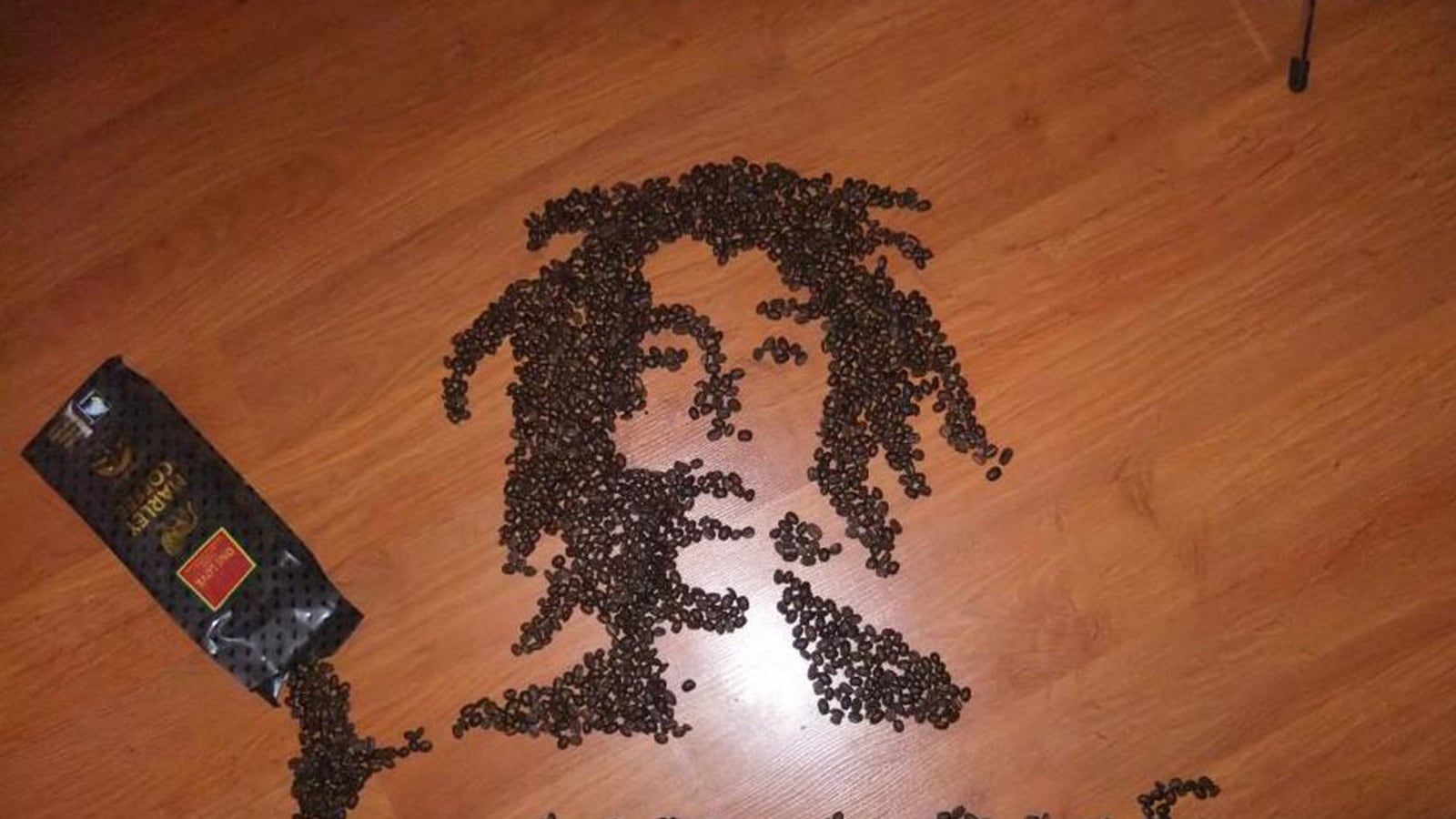Stepping into Rohan Marley’s expansive TriBeCa apartment for breakfast on Tuesday, I expected to find hints of his father Bob’s legacy—family photos, concert posters, or platinum records; maybe even a bong or high-tech vaporizer (this is the digital age, after all).
The 42-year old Rohan is the sixth child of the legendary reggae singer and devout Rastafarian who revolutionized music during the 1960s with Bob Marley and the Wailers.
Marley, who has eleven children (or more) by at least seven different women, has become a permanent icon for every pot-smoking hippy on college campuses across the world. As well as his brilliant reggae music, Marley Sr. was famed for his love of weed.
I was looking for any hint of a father-son connection—especially since the purpose of my visit was to hear about the growth of Rohan’s company, Marley Coffee, which bears the family name and vows to keep Bob’s legacy alive.
But the only thing I saw was an all-too-familiar silhouette portrait of Bob, framed but unhanged, in the corner of the room. Rohan has short hair, and was dressed in loose pants, a patterned button down and a pair of sandals.
The lack of an immediate father-son echo made me wonder if Rohan was no different to other celebrity offspring who rebel away from the large shadow of their culturally iconic parent.
Frances Bean, Kurt Cobain’s daughter, recently proclaimed to Rolling Stone that she doesn’t even “like Nirvana that much…The grunge scene is not what I’m interested in,” so could Rohan be hiding his family’s legacy as well?
As it turns out, the abode is just one of a few properties Rohan owns—his primary residence is in Miami, while there are two corporate offices in Denver, Colorado, and his childhood home in Kingston, Jamaica, where the majority of Bob’s memorabilia resides at the Bob Marley Museum.
“My father gave a message about love and life, righteousness and god-consciousness,” Rohan told The Daily Beast of his connection with his dad and the similar beliefs that they have. “[I] gravitated towards that because, as a father, you instill the principles of what you believe and what has made your life better.”
Which is why, in 2009, Rohan co-founded Marley Coffee to honor his father’s dream of one day returning to the farming ways of his childhood in Jamaica and continue to share the principles of love, passion and social responsibility with the rest of the world.
Their sustainably grown, ethically farmed and artisan-roasted coffee beans are mostly sourced from Ethiopia, but are often mixed with beans from Jamaica. Each flavor is labeled with the same name of various classic Bob Marley songs like “Get Up, Stand Up,” “One Love,” and “Simmer Down.”
As he speaks, his dialect holds the same Jamaican intonations as his fathers, but where the older was known for his very chill—and possibly marijuana-induced—demeanor, the younger Marley is highly animated and loves to chat.
He spits out story after story with such passion and liveliness that if we weren’t dining from a menu of coffee-infused food and drinks, I’d have started to question what was fueling his intense energy.
Thinking back on his father as we spoke, Rohan remembers a “strong man” who was “very precise in what he desired.” He was nine years old when his father passed away from melanoma in 1981, so most of what he know comes from the memories his family has kept alive.
“I didn’t really understand the magnitude of my father’s legacy until I was much older,” he added.
When the Marley patriarch passed away there was no will to allocate his assets. So, in 1987, Jamaican courts ordered his estate to be sold and the proceeds be allocated among his widow, Rita, and his eleven offspring.
Chris Blackwell, who signed Marley to Island Records in 1973, reportedly made an $8.2 million bid to secure the acquisition of song catalogue, recordings, royalties, and distribution rights, as well as all rights to his name and likeness.
“They offered to give us $20 million,” Rohan said of the figure, but the family declined that. “We were not going to sell our father’s name and likeness. We had to take Chris Blackwell to Privy Council in England (the court has final say on Jamaican judicial matters) to obtain first rights refusal.” Eventually, the family obtained the rights to the Bob Marley legacy.
Their efforts to properly license Marley lasted a little over a decade.
The amount of unofficial or unlicensed merchandise became unmanageable, so the family decided to form Hope Road Merchandising, LLC before branching out to other ventures like House of Marley.
“Basically, we didn’t want to see our father’s face on a bobble head doll,” he said laughingly. So, all “official” Marley items are marked by the brand’s logo. Items range from tee shirts to stereos to watches.
Some might find that very act of using their father’s name and likeness for personal gain exploitative, but living in the shadow of legacy can be a double-edged sword.
“Sometimes you do get that little special treatment,” Rohan said of bearing the Marley name. “But I played a lot of football and growing up in the world of sports it was much more competitive. I had a lot of people say to me, ‘You’re only here because you’re Bob’s son’ so it was kind of difficult in that way because people just think you are handed everything.”
Rohan played linebacker for the University of Miami before joining the Canadian Football League with the Ottawa Rough Riders, who have since disbanded. His eldest son, Nicolas—one of two children from his first marriage—currently plays football at Tulane University. Rohan has five others with Grammy-winning artist Lauryn Hill.
“He’s totally different,” Rohan said of Nicolas. “People appreciate him because he’s Bob’s grandson, but he’s not a singer; he’s an athlete. They appreciate him because he’s cool, he’s himself, and he’s Bob’s grandson. He handles himself very well because he understands the importance of getting an education and excelling at what you do.”
Avoiding the legacy all together would seem like a dismissal of the great man Bob Marley was. Which is why all family endeavors shy away from the use of their father’s first name in product.
“We didn’t call it Bob Marley and we don’t have our dad’s face on the brand,” Rohan said. “And I could not create something just for myself. If it says Marley, it has to be family. Everyone works in conjunction with one another in carrying on the legacy.”
One of their most recent (if not least surprising) family endeavors is Marley Natural, billed as the “world’s first global cannabis brand” and sells everything from marijuana-based lotions to heirloom Jamaican cannabis strains.
“We are absolutely preparing ourselves for when [marijuana] is completely legalized,” he said. “There are so many different elements within the plant that can cure so many things,” he added as he listed off a dozen of medical ailments like cancer and bulimia. “That’s why it’s being tested every day and you hear the president,” speak positively on both the legalization and decriminalization of the drug.
President Obama, who previously confessed to using the drug as a teenager and being a long-time fan of Bob Marley, recently paid homage to the late musician in an unscheduled visit to Marley’s former home in Kingston, Jamaica. It’s now the Bob Marley museum.
“It doesn’t get much better than that! We really loved it,” Rohan said of the surprise visit. “That’s the house where we all grew up and we were elated. I was super-impressed to show our father that respect and honor.”





